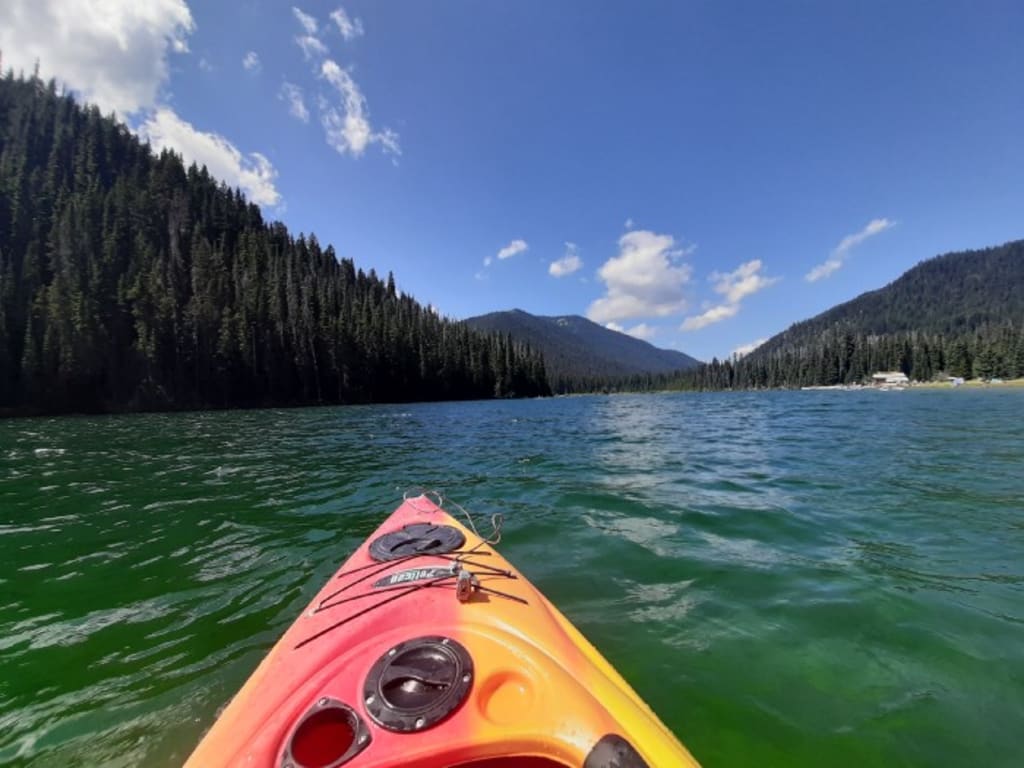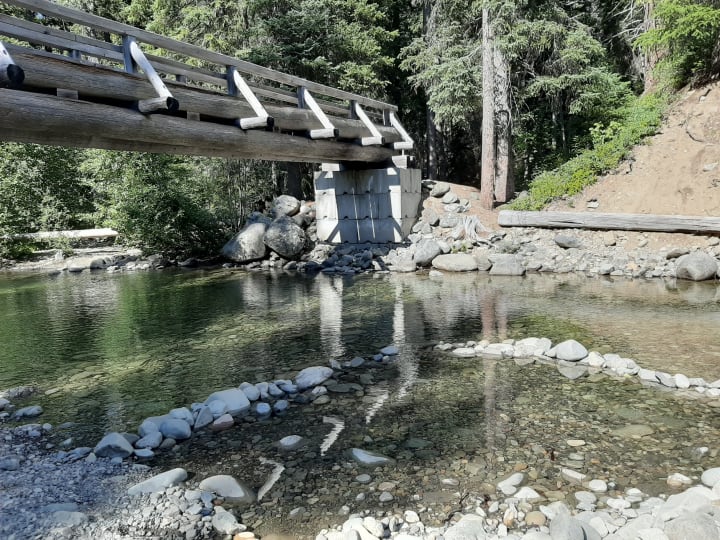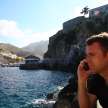Ghosts, Gold, and Gratitude in BC’s Most Popular Park
There’s nothing like a kayaking trip to make you feel grateful

As soon as I climbed into the boat, I knew it was a mistake.
Not all kayaks are created equal. Some are heavy and slow, but almost untippable. Others are light and fast and precarious. Ever the gentleman, I let my wife’s nervousness convince me to offer her the steadier kayak. And while she paddled off contentedly over the lake’s green water, I launched myself from the beach and almost instantly capsized.
I come from a line of farmers, not sailors. I’m the most lumpen of proletarians, and I need to sit down to put my shoes on.
Back when I delivered appliances for a living, my sense of balance was enough to keep me moving on stairs I couldn’t see past the stainless steel bulk of a six hundred pound refrigerator.
But that balance has evaporated over time, along with the strength that went with it. Years of sitting at a desk and lifting nothing heavier than a glass of wine have made me uniquely unsuited for this adventure.
But the lake is glorious in the sun.
The water shines the color of the trees, and white-bellied ospreys circle in the flawless air. The occasional slap and splash of leaping fish travels quickly over the lake’s calm surface. Dragonflies the size of sparrows buzz past, the long prehensile tail of one gripping the head of another in a bizarre courtship dance.
The world is alive on days like this.
All of it fits. The high sun of summer turns the mountain snow into lake water, and ravens croak in greeting as you wobble past in a rented boat. The water is so clear you can see the stumps of trees that lie beneath the surface, their twisted roots casting emerald shadows across submerged stones as flat bars of sunlight push through.
And slowly, you adjust. The movement of the boat begins to feel natural. There’s a rhythm to water just like there’s a wavelength to light, and you can feel it even if you can’t see it. Keep your hips loose, keep your head up, and keep paddling.
These mountains used to sing with the ringing of hammers.
In the mid-19th century, grizzled men led packs of mules along treacherous stony trails. Their eyes looked down, forever flickering over the ground in front of them, checking every stream for the faint sparkle of riches. There’s gold in these mountains, and if a man was willing to work for it, if he had even a little bit of luck, he could make his fortune with nothing more than a pan and a shovel.
And so men came. Thirty thousand of them, mostly from America. Hardened veterans of the California gold rush, and greenhorns eager not to miss another opportunity. Word spread in San Francisco like the fires that scoured the hills that there was a rich vein to be mined up north.
The land was wild and belonged to no one. Claimed by the British crown, the dense forests and rushing rivers knew no queen. Every gold miner knows you don’t own anything unless you can hold it in your hand.
What used to be wilderness is now a park.
The splintered trees, crumbling in the dry wind, barely conceal a constellation of campgrounds. There’s even a restaurant where you can get firewood, bags of ice, and enough phone reception to see if anybody likes you.
Pit toilets stand discreetly in the shade of a few trees near the shore of the lake. On a summer day, the air is full of music and laughter and the sound of tired fathers pumping up inflatable toys for the kids. A place where men once braved wild animals and bitter winters and sudden drops into nothingness to make a fortune is now a spot where we go to play. Less than two hour’s drive from the city of Vancouver, EC Manning Park is one of BC’s most popular.
We fought the wind up the lake. There were four of us: my brother, his daughter, my wife, and me. The V-shaped wakes of our rented boats spread and merged behind us as we paddled, one or another of us now pulling ahead, then falling behind. Leapfrogging past one another, we made our way to the far end of the lake and entered the river.
Sunbathers sat in clusters along the grassy banks. A footbridge spanned the river, and a young girl jumped from it into the water to the cheers of her friends. We paddled through shallow water until the gravel of the riverbed scraped against the bottom of our kayaks. I plunged my hands into the cool water to push myself free.
And then the river opened up again into another lake. This time, there was no one around. One by one, we slid out into the glassy water, carving silvery trails across the reflections of mountains as we fanned out.
This is the best part about living in BC, the aspect that drew a misanthrope like me to the province in the first place. No matter how busy a place gets, you only need to go a little bit further to find yourself in what feels like an undiscovered country.
Before the gold rush, there was no British Columbia.
An area of land almost four times the size of Britain produced nothing more than the pelts of luckless animals. Indigenous villages clung to riverbanks and coastal inlets, decimated by sicknesses brought by Europeans.
The longhouses sagged. The totem poles rotted. The indigenous people were told they were subjects of a powerful queen over the water, but there was little sign of that power. Only on Vancouver Island, the large landmass off the western coast, had a British colony been established.
And when the governor of the colony sent a shipment of gold ore to San Francisco to be minted, this untamed wilderness became suddenly popular. The island colony was swamped by men who came by ship from the south. Victoria, at the time a village of five hundred people, received thirty thousand miners in one month.
But the gold was on the mainland. So the miners crossed the sea again and followed the broad Fraser River inland, always searching for that bright speck of river-washed treasure.
The Fraser River Valley was flooded with foreigners. And the presence of gold made these mountains suddenly worth having. The Colony of British Columbia was founded in 1858 as a direct result of the gold rush. British troops were moved into the mountains to build roads and maintain order and remind the grasping Americans who was in charge.
And when their work was done, many of the soldiers and military engineers stayed in the Valley, swapping rifle and saber for pickax and pan. Some of their descendants must still live here, selling firewood or planting trees or building websites in the shadow of the mountains their forebears mined. I hope so.
It’s a big world.
While the prospectors were scouring these rivers for gold, my ancestors were plowing fields and watching for rain on the west coast of Ireland. Maybe they read a tiny note in the newspapers about the gold discovery in far-off Canada. Maybe they wondered what it might be like to travel across the ocean and pull fistfuls of wealth out of the mountain’s cold veins.
But they didn’t get the chance. In 1858, while these hills rang with hammers, Ireland was ruled by the British and still recovering from the Great Famine.
And while I made my way across the placid water with my family, I thought of all the things I’ve seen that even my grandparents never saw.
I thought of the multiple clauses and catches and coincidences that had to obligingly arrange themselves like painted stars in a nativity play to allow me to be here.
I thought of all the people who toiled without reward in these fractured mountains and others just like them.
I thought about how I make a living at home in my pajamas, while my grandfather used to come home with a broken nose and busted ribs after workplace disputes with his colleagues.
For a moment, over the great silence of the lonely lake, I heard those hammers ringing out again. And I felt nothing but gratitude for the gold I’ve managed to find here.

Everything has changed, and nothing has.
The gold is still there; it’s just buried deeper than it used to be. The easy pickings were taken long ago. Now it takes money to make money.
And the mountains around the park are pierced with shafts and tunnels that you can explore today if you can find them. Cold air rushes out from the darkness as though the mountains are breathing. Spray-painted signs scream at you to stay out, to go back. In the woods, abandoned trucks grow tall trees inside rusted engine compartments.
The same struggle still goes on. People do battle to scrape the sharp edges off the world while nature waits patiently to repossess everything. Even today, as the price of gold continues its age-old climb, mining companies are turning their eyes again to this park and the unprotected land around it. Even in the ancient darkness underground, those bright veins call to us.
The world doesn’t run on leisure and pleasure. It would be nice if all we needed from the mountains was a quiet campsite and a placid lake to paddle on.
But somewhere, someone has to be pulling a living from the earth. Someone has to be scraping in the dirt for me to splash around in the sunshine. Just because it doesn’t happen here anymore doesn’t mean it doesn’t happen. It has to.
It’s dark on the lake now. That fat half-moon will be shining in the water, touching the tips of the wind-born wavelets with flecks of silver. The ghosts of soldiers and engineers and prospectors will sleep forever in the voiceless rocks of the mountains.
And of the million people who come to swim and paddle in the lake each year, only a few will hear those ghostly hammers ringing out in the silence.
About the Creator
Ryan Frawley
Towers, Temples, Palaces: Essays From Europe out now!
Novelist, entomologist and cat owner. Ryan Frawley is the author of many articles and stories and one novel, Scar, available from online bookstores everywhere.







Comments
There are no comments for this story
Be the first to respond and start the conversation.